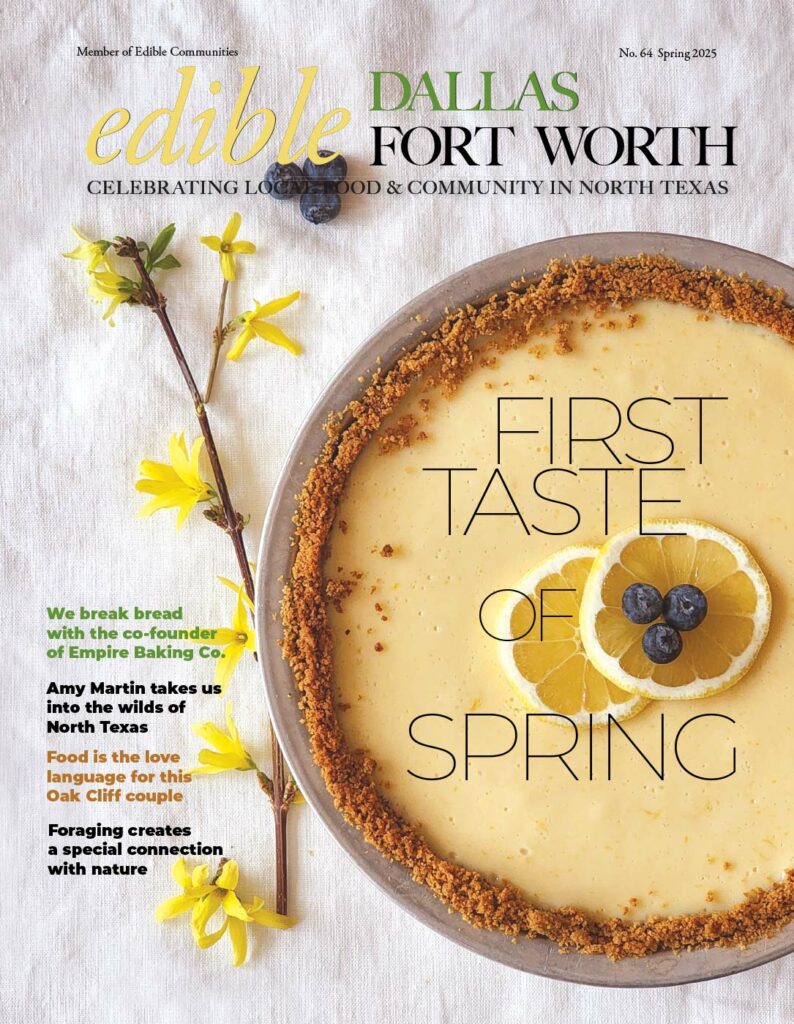Aaron Pinkus, Blue Label Herbs
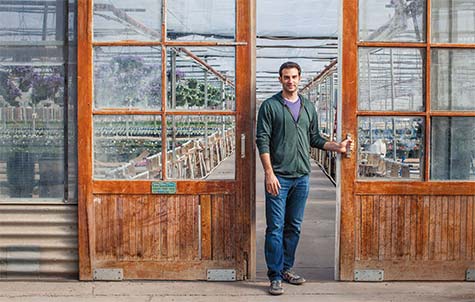 Aaron in front of the Nortex greenhouse
Aaron in front of the Nortex greenhouse
Photography by Melinda Ortley
The temperature is barely above freezing on the January day I visit Nortex Wholesale Nursery in Wylie. The company’s 33-year-old Vice President and General Manager Aaron Pinkus greets me in his fleece shirt and down vest and leads me to one of the 20 greenhouses adorning their 49-acre property. A milky, late-afternoon sun filters through the opaque skylights as Aaron rolls back the greenhouse door. Inside, in a world hung with sprinklers and laced with pipes, the air is a steady 68°F. Raised benches hold a haze of green from the herbs and vegetables growing there: tender jade, apple green, dark, reddish, brownish green. Here, seeds become seedlings and finally plants, hardy enough for the retail market.
Aaron is a third-generation plantsman. His parents, Jon and Lillian, own the business, founded in 1972. His grandfather, Ralph, opened Dallas’ first garden center, North Haven Gardens, in 1951 and was involved in establishing the Dallas Arboretum. Aaron has learned by example how to make things grow and thrive—a plant, a family company.
He didn’t intend to join the family business. Born a few years after the nursery’s founding, Aaron grew up playing cops and robbers on what was then rural grounds. It’s easy to picture a younger version of him ducking between the bright oil cloth-covered picnic tables in the staff’s break area. He rode the plant carts with his brother and put his Boy Scout skills to use clearing shrubs when his father decided to extend the usable growing space on the lot. But he set out to be a businessman, not a plantsman. He earned a degree in finance from the University of Denver and then circumstance led him back to the family business.
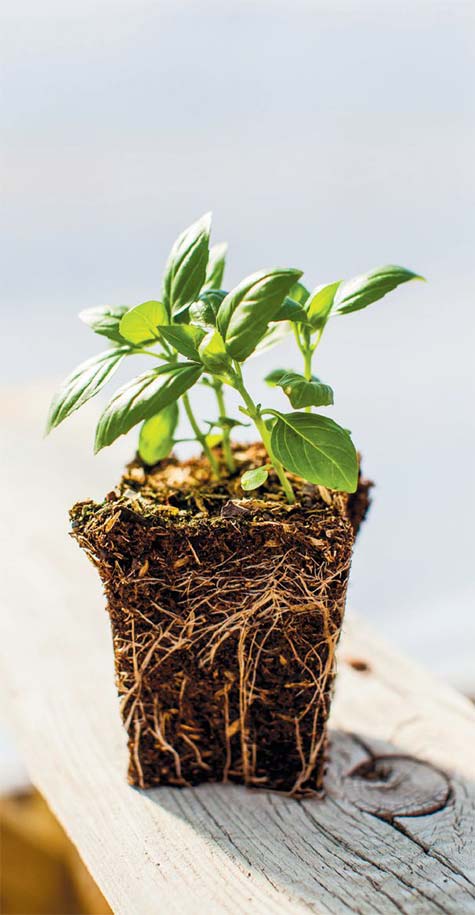
“It’s really neat to see it from an entirely different perspective,” he says. “I’ve my whole life been on the business side of things.” After joining the company in 2003, he designed the database system that allowed them, for the first time, to track orders, compare inputs and outputs, run analyses of costs and sales. It took him two years. Before, he says, “We would just plan and hope for the best.” Seeing an increased interest in culinary herbs, he created a brand, Blue Label Herbs, and has grown that segment of the business from 5 to 25 % of the nursery’s production.
“This is where everything starts,” Aaron says, as we enter the propagation room, a long, low greenhouse where irrigation comes in the form of a gentle mist, so fragile is the new life here. Pipes under the benches heat the soil directly to incubate the fledglings. “It smells great,” he says, running his hands over tufts of rosemary, thyme and mint. “It’s fun to watch the plants develop.”
He hands me a thumb-sized plug of rosemary, pungent and piney. Here, tiny shoots grow into fully rooted plants. They must be handwatered until they spread their spidery web of roots and are ready to be potted and moved to another greenhouse. Whether the plants come as seeds, plugs or cuttings, none of them are GMO. Also, while Nortex isn’t certified organic, they use natural products and employ predatory insects to keep pests at bay. Runoff water is captured in a collection tank and reused.
“The biggest challenge is the weather,” Aaron says. “The weather changes everything.” In this region where temperatures can oscillate wildly, it’s an effort to create constancy inside the greenhouses. Pipes above our heads radiate heat from the water pumped by three orange boilers that date to the nursery’s founding. It’s the most efficient method of heating—more efficient than turbine or blower heaters. But steel pipe cost three cents a foot when the orange behemoths and original 10 miles of piping went in. Now it costs $3 a foot. They’ve had to adopt other heating methods even as they retained the old, venerable structures. “We take good care of our boilers,” Aaron says, smiling. His head mechanic “knows every pipe, every hose.”
Still, they live with constant reminders that they’re up against bigger forces. During December’s ice storm, Aaron awoke at 2 a.m. to an emergency alert on his phone and drove out to Wylie from his Uptown apartment. The power had gone out. By the time he and his father got everything running by 6 a.m., the temperature in the greenhouses had dropped to 41°F. This is what it means to be the caretakers of plants in an environment that isn’t always hospitable.
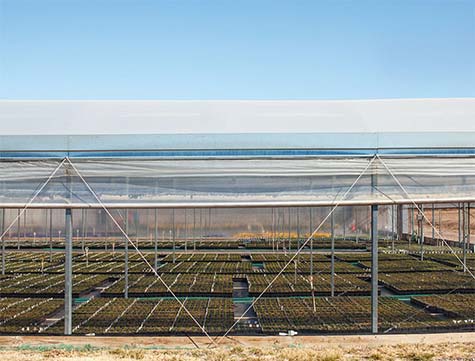
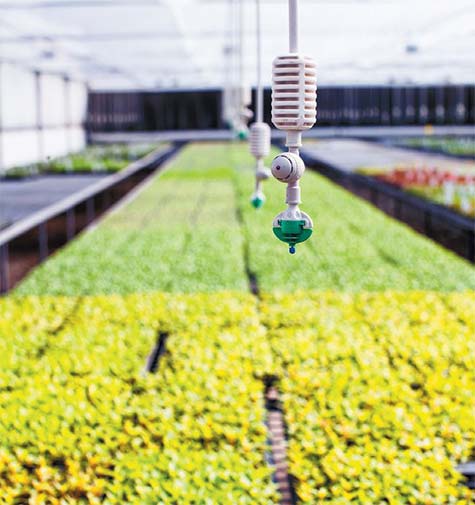
Behind the scenes, they wrangle Texas’ meteorological orneriness. In a greenhouse where rubber boots flank the door, Aaron has me sample a leaf from a plant labeled Hot and Spicy Oregano. The final flavor is like an unexpected dash of Tabasco on the tongue. This world of varietals is part of the grand panoply of nature that so fascinated his grandfather Ralph. “He was a plant lover,” a man deeply intrigued by plants’ properties and uses, Aaron says. On his visits to the nursery, which were frequent, even up to his death at age 97 last September, Ralph would ask, “Are you growing anything new?” In a later interview, Jon fills me in on details about Ralph’s youth and the horticultural passion that apparently manifested early. For example in the twig collection he amassed as a boy in Philadelphia.
“He could identify over 100 trees just by the twig,” Jon says. After college, Ralph worked with trees and shrubs at the New York Botanical Garden, and during World War II he helped grow quinine in Guatemala for malaria treatment. Given the chance to settle in horticulturally mild climes, he rejected the notion of going where “anybody” could make things grow, Jon says. Texas appealed precisely because of its challenges. Here, the plant patriarch felt he could make a difference. Reminders of his pet projects at Nortex include an array of crape myrtles and a shade garden of ferns and hostas. In many ways, the nursery still functions as an important trial lab: they experiment with varietals they may discover at shows, and “see what works for our area.”
“Nortex is unique in that it’s a family business,” says Cody Hoya, General Manager at North Haven Gardens, the garden center and sister-company that relies heavily on Nortex for its stock. According to Hoya, “There’s no match for them” in the area for quality and variety. “It’s not hard to find the basics: your basic basil, basic thyme.” But where can you find purple-ruffled basil or variegated gold thyme—plants with ornamental as well as culinary uses? Customers come to North Haven “expecting to be inspired,” he adds.
Many wholesale growers “are reluctant to take up growing space with new things.” Nortex is “open-minded.”
The goal, says Aaron, is to provide plants “that people in Texas will be successful growing.” With no prolonged time when the ground is too cold and hard to work, Texas essentially has a 12-month growing calendar. However, its seasonal patterns are more complicated: three planting seasons, not two. Scorching summer temperatures mean gardeners cannot assume that their spring plants will survive past June: summer and spring are not interchangeable.
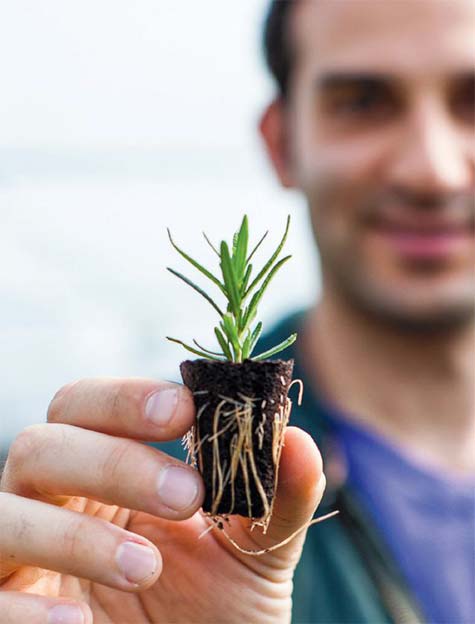
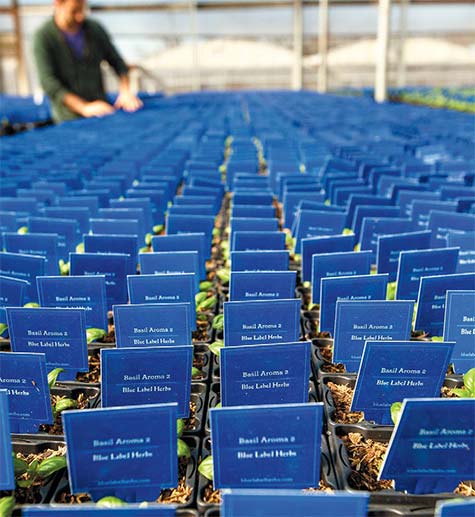
Here, varietals play a role. Aaron uses basil as an example. Nortex grows 19 varieties of basil. People are accustomed to sweet Italian basil, he says. But that variety craves heat and aggressively seeks the sun. It’s ideal for Texas summers, but when sun is scarcer, the plant stretches, angling for warmth, and flops over. Another variety, Aroma 2, is “not nearly as aggressive,” he says, “so when it’s cold and there’s not as much sunlight, it does better,” staying shapely and compact. Conversely, he doesn’t offer cilantro in the summer, though elsewhere it’s a summer crop. Texas’ crushing heat would make it wilt. “I’m not going to grow cilantro if people aren’t going to have success with it,” he says. They keep the long-term goal in mind. “It’s not about a one-time sale,” Jon says. “It’s about a home gardener who has a relationship with a home garden.” When customers buy a plant, they should be able to “trust it’s been well taken care of,” not suffered a whiplash cycle, from “wilt to drown to wilt to drown,” in a place with little regard for its welfare.
“I don’t think there’s such a thing as a green thumb or a brown thumb,” Jon says. “It’s just paying attention. It’s respecting the needs of the plants.”
At the end of my tour with Aaron, the sun is setting over a greenhouse that is smaller and lower than the others. It’s the newest greenhouse, one he designed with his father specifically in response to Texas conditions. For a place with temperature extremes, its lower profile means less space to heat in the winter, less hot air to move out in the summer. The roof is designed so the vent sits at the highest point. Father and son have noticed that in other designs, a space above the vent leaves a pocket of stagnant heat in the summer, when they desperately need to keep plants cool.
As we walk away, I think about what the greenhouse represents: a family adapting to and shaping the local horticultural landscape. Aaron, next to me, is poised between old and new—aware of his legacy, striding forward.
Go to bluelabelherbs.com for retail locations.
EVE HILL-AGNUS teaches English and journalism and is a freelance writer based in Dallas. She earned degrees in English and Education from Stanford University. Her work has appeared in the Dallas Morning News, D Magazine, and the journal Food, Culture & Society. She remains a contributing Food & Wine columnist for the Los Altos Town Crier, the Bay-Area newspaper where she stumbled into journalism by writing food articles during grad school. Her French-American background and childhood spent in France fuel her enduring love for French food and its history. She is also obsessed with goats and cheese.
- Eve Hill-Agnushttps://www.edibledfw.com/author/ehillagnus/
- Eve Hill-Agnushttps://www.edibledfw.com/author/ehillagnus/
- Eve Hill-Agnushttps://www.edibledfw.com/author/ehillagnus/
- Eve Hill-Agnushttps://www.edibledfw.com/author/ehillagnus/


